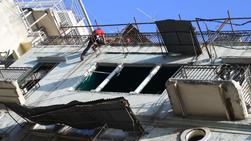 French firefighters scale the side of a damaged building to clear debris in the Lebanese capital's Gemmayze area on August 29, 2020, in the aftermath of a massive explosion which devastated swathes of Beirut. (PHOTO / AFP)
French firefighters scale the side of a damaged building to clear debris in the Lebanese capital's Gemmayze area on August 29, 2020, in the aftermath of a massive explosion which devastated swathes of Beirut. (PHOTO / AFP)
BEIRUT - Lebanon’s army said on Thursday it had found 4.35 tonnes of ammonium nitrate near the entrance of a site where the Beirut port blast occurred last month, while rescue workers dug through the rubble of a collapsed building with their hands on Friday after signs of life were detected near the explosion site.
Army engineers were “dealing with it,” according to an army statement carried by the state news agency NNA. The blast was cuased by the the same kind of highly explosive chemical.
Army engineers were “dealing with it,” according to an army statement carried by the state news agency NNA. The statement said the chemicals were found outside entrance nine to the port
A group of workers pulled up chunks of concrete and other broken masonry as they dug down in the residential district of Gemmayze after rescue workers said on Thursday they had detected signs of a pulse and breathing, a Reuters witness said.
A crane was brought to the search area to help by carefully lifting up steel girders and other heavy pieces of debris.
READ MORE: After port blast, rudderless Lebanon drifts towards the rocks
The team of rescue workers included volunteers who came from Chile, as well as Lebanese volunteers and members of the civil defense.
Residents gathered nearby, holding out hope that someone could be found, while some voiced frustration that not enough had been done earlier to find survivors.
The catastrophic explosion on Aug 4 that ripped through the city killed about 190 people. The authorities said it was caused by about 2,750 tonnes of ammonium nitrate that had been stacked in unsafe conditions in a port warehouse for years.
The blast smashed entire neighbourhoods, gutting buildings and injuring 6,000 people
ALSO READ: 25 held over Beirut explosion, says Lebanon's president
The blast smashed entire neighbourhoods, gutting buildings and injuring 6,000 people.
Lebanon’s government quit amid public anger in a nation already brought to its knees by an economic crisis. The public remains anxious that more hazardous materials are being stored badly, putting them at risk.
Earlier on Thursday, President Michel Aoun ordered repairs to be made to old refuelling infrastructure at Beirut airport and called for an investigation into a report that thousands of litres of fuel had leaked from the system.
Beirut airport head Fadi el-Hassan told a news conference that a leak of 84,000 litres of fuel had occurred in March 2019 and repairs were completed in two months. He said international investigators had described the repairs as “satisfactory”.
News of the leak added to concerns about public safety. “No explosion is awaiting us,” Hassan told the news conference.


